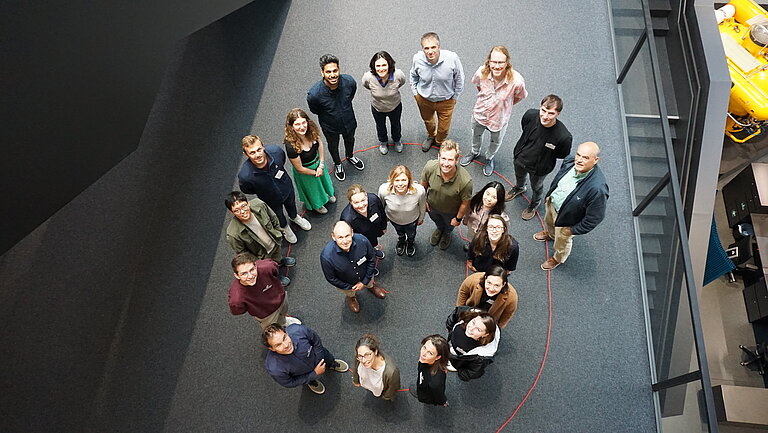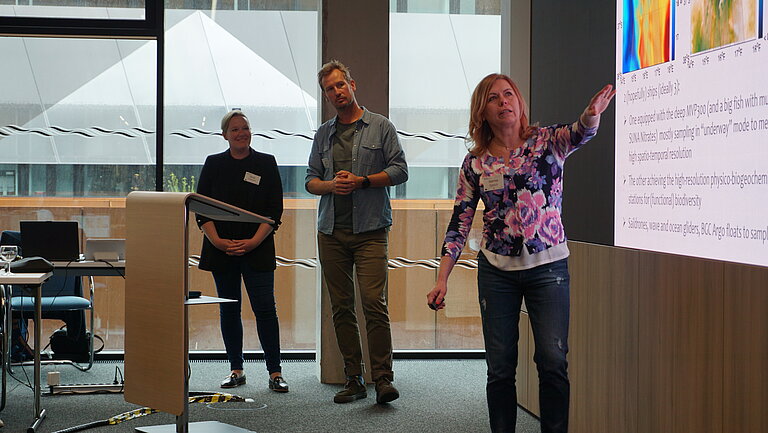Do ocean fine-scale whirls impact our climate and ecosystems?
Kick-off of the interdisciplinary EU ERC-Synergy Grant Project WHIRLS
The ERC-Synergy Grant project WHIRLS was launched with a kick-off meeting at GEOMAR Helmholtz Centre for Ocean Research, Kiel, on 3-5 June. The kick-off was the start for the WHIRLS partners and the growing community towards the joint interdisciplinary journey to explore the impact of ocean fine-scale whirls on climate and ecosystems. “The findings from WHIRLS will help us to understand the large-scale effects of these rather small eddies and thus improve climate models” says Prof. Arne Biastoch, ocean modeler at GEOMAR and coordinator of WHIRLS. “Our kick-off meeting was the beginning of a joint interdisciplinary journey,” emphasise the three leading scientists in WHIRLS, Prof. Sabrina Speich (Ecole normale supérieure-PSL, France), Prof. Sebastiaan Swart (University of Gothenburg, Sweden) and Prof. Sarah Fawcett (University of Cape Town, South Africa).
The meeting was conducted as a hybrid meeting to allow short-notice, sustainable and fit-for-purpose participation and engagement in WHIRLS. Participants from various countries such as Germany, France, Sweden, South Africa, USA, Norway, Italy etc. interested in air-sea interaction, biogeochemistry, ocean biomes and ocean dynamics and modelling came together to discuss and plan the next strategic steps in WHIRLS towards the overall goals of WHIRLS. Main emphasis was on the planning for the extensive ship-based campaign in the Cape Basin around South Africa in 2026 and the co-designed numerical model concept.
Together with the WHIRLS community, the four WHIRLS partners (GEOMAR, ENS-PSL, University of Gothenburg and University of Cape Town) discussed specific steps guiding the observing and modelling strategies. As WHIRLS will generate a large amount of data of various types, either through the WHIRLS project tasks or in cooperation with partners, one focus of the meeting was on data management. Over its lifetime, WHIRLS will train at least eleven doctoral researchers, eight postdocs as well as a number of Masters students. Accordingly, another focus of the meeting was the interdisciplinary involvement of early career researchers in WHIRLS to ensure mutual benefit for the researchers and the project. WHIRLS will run for six years and has a total budget of almost €12 million.
Background: ERC Synergy Grant
The European Research Council (ERC), established by the European Union in 2007, is the main European funding organisation for excellent frontier research. ERC Synergy Grants for projects that combine the expertise of several scientists from different fields support collaboration between researchers working together to address ambitious questions that could not be addressed by the individual participants and their teams working alone. These projects enable significant advances at the frontiers of knowledge, for example through cross-fertilisation between scientific fields or through new, even unconventional, research approaches, methods and techniques.

Participants at the kick-off event for the interdisciplinary WHIRLS project. Photo: Markus Scheinert, GEOMAR

The leading scientists Sarah Fawcett, Seb Swart and Sabrina Speich (from left to right) present WHIRLS at the kick-off event for the interdisciplinary ERC Synergy Grant Project. Photo: Markus Scheinert, GEOMAR


